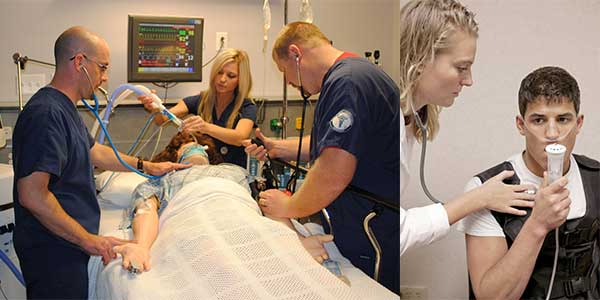BSc Respiratory Therapy ( Bachelor of Science in Respiratory Care Therapy )
[one_half][ads1][/one_half]Respiratory therapists work with doctors and other healthcare professionals to evaluate, treat and care for patients who have breathing and other cardiopulmonary disorders. They also perform diagnostic test and limited physical examination. Therapists utilize complex, specialized equipment to help people breathe. They prove treatments that give temporary relief for problems such as emphysema and chronic asthma.
BSc Respiratory Therapy provide more complex therapies which need independent judgement. Thy also consult with doctors and other healthcare personal in order to create and modify the treatments strategies for patients.
BSc Respiratory Therapy Eligibility
Should have passed Senior Secondary (12th Standard / Intermediate) examination with Physics, Chemistry and Biology from Central Board of Secondary Education or any other examination recognized by R G U H S as equivalent.
Lateral Entry
Candidates who have secured a diploma in Respiratory Care Therapy from a board recognized by the Government or any other equivalent authority can gain entry to second year of the course.
Responsibilities
- Offer treatments with oxygen or oxygen mixtures, aerosol meditation and physiotherapy.
- Connect patients to ventilators.
- Evaluate patients lung capacity.
- Test people for lung abnormalities.
- Consult with doctors and other healthcare personnel to create and modify care plans.
- Make sure the equipment is working properly.
- Measure patients concentration of oxygen and other gases in their blood.
- Determine the P H level, which shows the acidity or alkalinity of a patient’s blood.
Scope
The demand for Respiratory Therapists will also increase since these professionals are expanding their role in disease prevention, case management, early detection of pulmonary disorders and emergency care. Most of the employment opportunities will continue to be provided by hospitals. Growth in job opportunities will also occur in other settings such as home healthcare services and doctor offices.
They typically advance in their careers by taking care of critically ill patients who have substantial problem with other organs such as kidney or the heart. Experienced therapists, particularly those who have advanced degrees, may have opportunities to acquire supervisory or managerial positions in respiratory therapy department.





